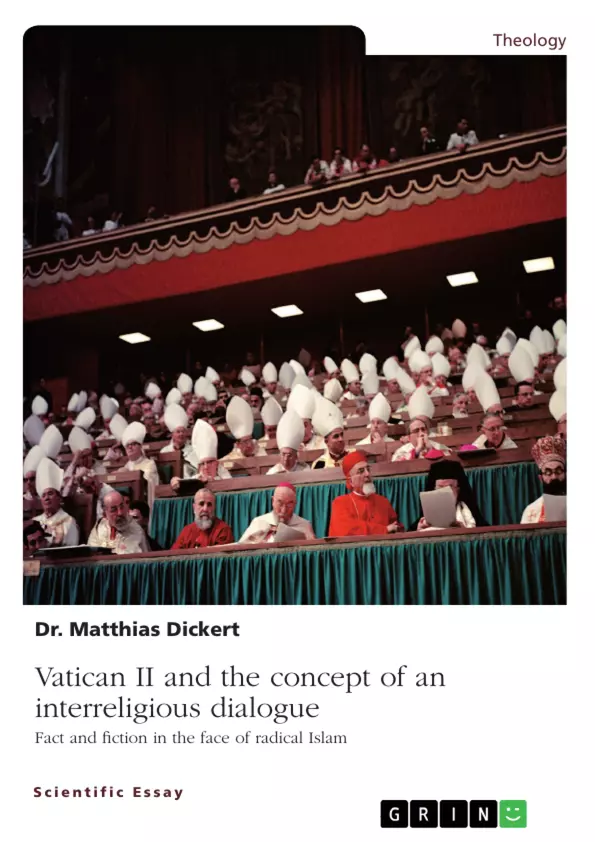Vatican II and its progressive declaration of the Roman Catholic Church in dealing with other religions, "Nostra Aetate", meant a turning point for the traditional Christian – non Christian relationship. This traditionally mostly negative relationship between the Catholic Church and other religions was now radically discussed anew and put on another scale with the aim of an improvement between all religions. A special focus hereby was put on a new approach with Judaism and above all Islam.
The history between Islam and Christianity for centuries was accompanied by political and religious conflicts and wars, which were marked by the notions of jihad and crusade.
It was in this antagonistic atmosphere where the famous four "Cs" of the West (Conquest, Commerce, Civilization and Christianity) were followed by terrorism and fundamentalism on the Muslim side.
Fundamental thinking, in fact, has not left the relationship between Islam and Christianity and the attitude to the West and Christianity in the Muslim world have turned to a more radical attitude since the Shah was overthrown in 1979 in Iran. One can take this date as the beginning of events such as 9/11, the Gulf Wars or the wars in Afghanistan and Syria where the Islamic State proclaimed a new and even more radical era between Islam and Christianity with the establishment of the caliphate, the geographical, political and religious expression of fundamental Islamic thinking.
Things have not yet improved to the better since developments like globalization processes are presently challenging traditional religions with a tendency to fundamental thinking as the (seemingly) best adapted form of the religious in times of globalization and massive migration waves due to war, poverty, hunger or environment pollution.
All these developments are constantly challenging the positive basis of an interreligious dialogue between Muslims and Christians, which during the last sixty years was marked by progress and regression on both sides alike.
Inhaltsverzeichnis (Table of Contents)
- Introductionary notes
- Christian Muslim relationship – a history of conflict and dialogue
- Vatican Two and Nostra Aetate a historical review
- Articles 1 - 5 of Nostra Aetate
- The Christian-Muslim dialogue since Vatican II.
- Islamic Fundamentalism a short survery
- Outlook – open questions.
Zielsetzung und Themenschwerpunkte (Objectives and Key Themes)
This critical essay examines the historical relationship between Christianity and Islam, focusing on the impact of Vatican II and its declaration Nostra Aetate on interreligious dialogue. The essay aims to provide a historical overview of the relationship between the two religions, highlighting both periods of conflict and collaboration. It then delves into the implications of Vatican II's declaration, analyzing its impact on dialogue and the emergence of Islamic fundamentalism.
- The historical relationship between Christianity and Islam, characterized by both conflict and dialogue.
- The significance of Vatican II and Nostra Aetate in fostering interreligious dialogue.
- The rise of Islamic fundamentalism and its impact on Christian-Muslim relations.
- The challenges and opportunities for interreligious dialogue in the modern world.
- The evolving understanding of Christian identity in a world of diverse religious experiences.
Zusammenfassung der Kapitel (Chapter Summaries)
The introductory chapter explores the context of Vatican II and its significance in shaping Christian-Muslim relations. The second chapter provides a historical overview of the often complex and conflict-ridden relationship between Christianity and Islam. The third chapter delves into the historical context of Vatican II and examines the key articles of Nostra Aetate. The fourth chapter analyzes the progress and setbacks of Christian-Muslim dialogue since Vatican II. The essay concludes with a forward-looking perspective on the challenges and opportunities for interreligious dialogue in the contemporary world.
Schlüsselwörter (Keywords)
The key terms and themes explored in this essay include Vatican II, Nostra Aetate, interreligious dialogue, Islamic fundamentalism, tradition versus modernity, jihad, peace, and brotherly love. The essay analyzes the implications of these concepts for Christian-Muslim relations, highlighting both historical and contemporary perspectives.
Frequently Asked Questions
What is "Nostra Aetate" and why is it important?
Nostra Aetate is a declaration from Vatican II that marked a turning point in the Roman Catholic Church's relationship with non-Christian religions, promoting dialogue and mutual respect.
How did Vatican II change the Church's view on Islam?
Vatican II shifted the relationship from centuries of conflict (marked by Crusades and Jihad) toward a positive basis for interreligious dialogue and shared moral values.
What are the main challenges to Christian-Muslim dialogue today?
Challenges include the rise of Islamic fundamentalism, political conflicts in the Middle East, and the impacts of globalization and migration.
What role did the year 1979 play in modern religious radicalization?
The overthrow of the Shah in Iran in 1979 is often seen as a starting point for a more radical era of Islamic fundamentalism that affected global relations.
How does globalization affect traditional religions?
Globalization processes can lead to a resurgence of fundamentalist thinking as a defensive reaction to rapid social change and migration waves.
- Quote paper
- Dr. Matthias Dickert (Author), 2023, Vatican II and the concept of an interreligious dialogue. Fact and fiction in the face of radical Islam, Munich, GRIN Verlag, https://www.grin.com/document/1383234



